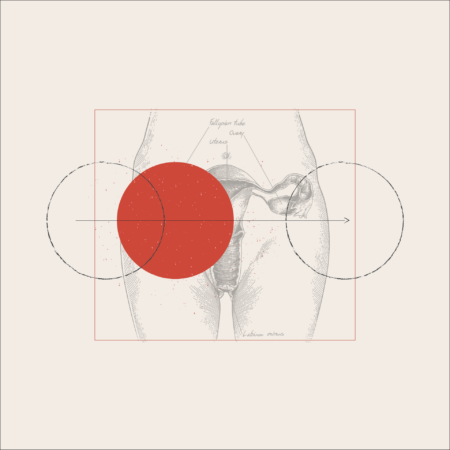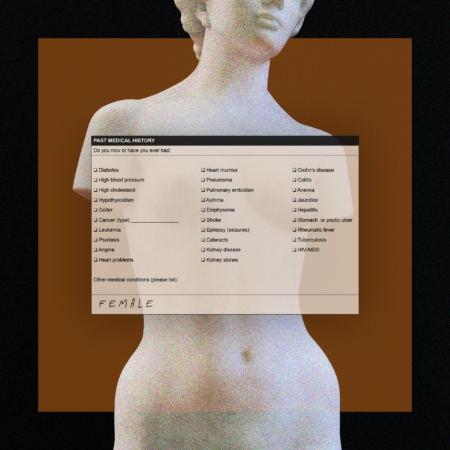As a researcher and educator in female and menstrual health, I am often the most popular person in a public restroom. Dinner parties and nights out always include being pulled aside by friends—male and female —for private conversations about everything from sex drive to vaginal discharge. Wine night with girlfriends, a book club, or even Thanksgiving dinner turn into female biology 101. Questions like “do women really only have one fertile day a month?” or “could my birth control be influencing [insert issue here]?” consistently reappear throughout my social life.
It’s easy to see why: 94 percent of more than 1,400 women failed a rudimentary Women’s Health IQ quiz, according to a recent study, while another survey by INTIMINA found that one in four women could not correctly identify the vagina. The Tampax Period Education Survey found 41 percent of women were not confident that they knew how to insert a tampon, meanwhile a survey by Plan International found 54 percent of women with period-related symptoms (including pain, cramping, headaches, bloating, and acne) thought their symptoms were normal, 13 percent said people told them they were exaggerating, and 27 percent felt embarrassed.
This fundamental lack of information is a direct result of the dearth of education about female bodies on a global scale. Beginning with the sparse information we receive at school, we are taught to disregard female-specific processes. In the doctor’s office, our cycles—and the symptoms related to them—are suppressed with birth control, acne medication, Mydol, or Advil without explanation as to how the cycle works at all. The standard societal norm is that individuals learn more specific information—basic reproductive anatomy, the phases of the menstrual cycle, how ovulation works—only if they are struggling to become pregnant (if they choose the path of motherhood), and are left trying to decipher what might be going wrong.
In the doctor's office, our cycles—and the symptoms related to them—are suppressed without explanation as to how the cycle works at all.
On top of this, the female body is often considered inappropriate, gross, or dirty across a variety of cultures, leading women to internalize their bodies as shameful. This is exemplified in the common tropes of using blue dye rather than blood in tampon advertisements, hiding period products on the way to the bathroom, and turning to Google—or in youth, Cosmopolitan—for answers about basic bodily functions. The ramifications of this are wide-ranging. At a minimum, women are left feeling ashamed, as well as isolated in their shame, about various aspects of their body—anything from hirsutism to the appearance of one’s vulva. More consequentially, women may suffer from symptoms that disturb their overall health and wellness, ranging from symptomatic nuisances that decrease quality of life (chronic vaginal infections impairing intimacy) to debilitating, painful conditions (such as endometriosis or PMDD) and have no idea why.
Finally, when women try to approach the medical system, they often face the consequence of decades of research bias that has not accounted for the female body. This leads women to go undiagnosed or misdiagnosed for everything from hormonal issues to autoimmune disorders and even heart attacks. They may also experience medical bias in how clinical providers respond to them, which unfortunately often follows historical adages that deem them “hysterical” rather than competent, leading to the dismissal of physical symptoms as psychologically-driven. It is an impossible expectation for women, after a lifetime of being kept in the dark, ashamed about their bodies, to then navigate a system that was not built with them in mind and succeed in doing so.
Still, while these issues are deeply entrenched on a societal level, they are also ripe for change and deeply meaningful when reversed. In my own experience overcoming a debilitating medical condition that completely deregulated my hormones, learning about and researching the fundamental, biological patterns of the menstrual cycle not only helped me regain my own health, but also regain agency over my body and create a deep sense of self.
As an educator on these issues, I see this occur systematically with the women I work with. When women become empowered with this knowledge (whether it’s because they are seeking an understanding they were never provided, looking to get to the root cause of a medical issue, trying to conceive, or navigating the opaque journey that is menopause), a beautiful shift happens. They feel newly in sync with their bodies, as well as confident and assured in a deeper, more meaningful way than they previously thought possible. Now, it’s time we ensure all women are armed with this knowledge, no matter what life stage they are in.
Tackling the health education gap is one of the most impactful places that individuals and organizations in the women’s health space can make a difference. From my vantage point working across the industry, this is happening in a collection of ways.
Female health companies are creating products that educate consumers:
From cycle-tracking apps to diagnostic at-home testing, companies are beginning to integrate educational content throughout their user journey to not only maximize the experience of their customers but also empower them to better understand and manage their own health and wellness. Women-founded companies are doing this at scale (think Oova, Tia, Clue, Modern Fertility, and Natalist). When companies prioritize including evidenced-based information throughout their messaging and deliverables, it benefits all parties and drives forward change.
Social change initiatives are increasing our ability to talk about these issues:
From the #MeToo movement to the Women’s March, we are navigating a new era of dismantling systems that have long silenced women. With this, a new “red wave” has emerged: a surge in activism around ending menstrual cycle stigma and recognizing and respecting menopause. Women-founded companies are stepping up to utilize their social presence to create progress, such as The Period Company normalizing menstruation, Elvie normalizing breastfeeding and postpartum, or Dame providing educational insights related to sex.
Platforms are creating safe spaces for women to learn about these topics together:
As this social movement to normalize and discuss women’s health in the public domain grows, it unravels generations of shame and secrecy, making it more possible for women to discuss their bodies openly and honestly. This has created a strong need for new platforms and forums for individuals to connect, learn from, and support one another. This is why I founded The FemGuide to provide basic education around the menstrual cycle and foster a community for those trying to live more in touch with their bodies. Other women-founded educational platforms and community forums are shifting the narrative around these topics while providing access to practical knowledge. This ranges across general health (Allbodies, The Femedic), sex and intimacy (Kama, Ferly), pregnancy and postpartum (Mahmee, Poppy Seed Health, June, Loom), menopause (Elektra Health), and more.
We are certainly moving away from a society where these topics are contained to the “ladies room”. Harnessing the element of education is an integral part of fixing women’s healthcare and one of the most direct ways to empower women at scale. Eventually, I hope to see changes at a systematic level, giving women access to this vital information from a young age—both at school and at home —so women are no longer required to actively seek it out themselves.
Dana Alloy is a scientific researcher, writer, and educator who works with companies across the women’s health space to translate scientific research for strategic initiatives and content. She also offers education and coaching via her platform and programs at TheFemGuide.





